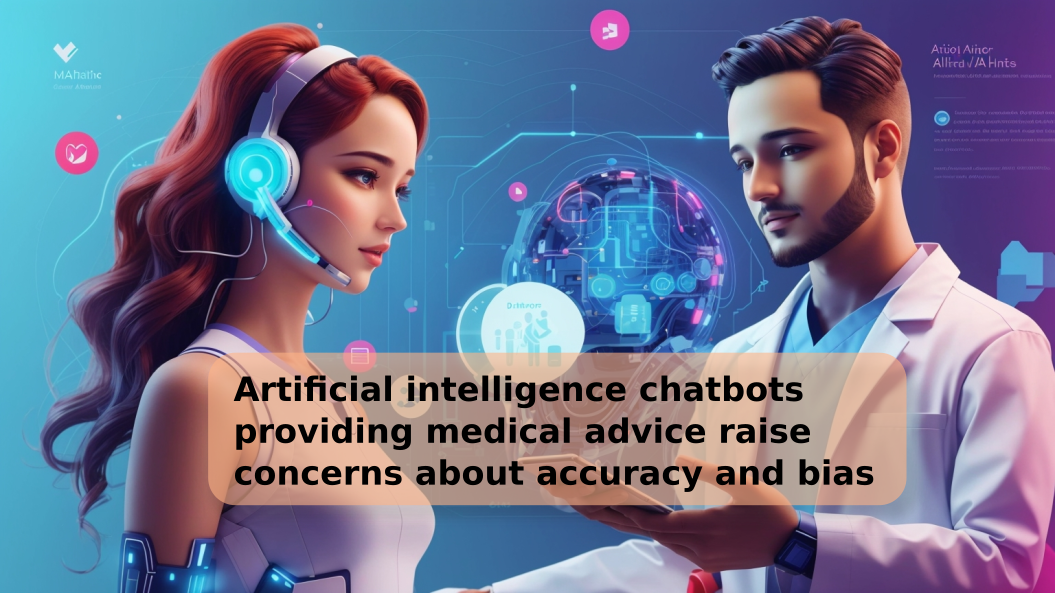
Artificial intelligence chatbots providing medical advice raise concerns about accuracy and bias
For years, the healthcare industry has been speculating about the role of artificial intelligence (AI) in transforming patient care. Now, AI-powered chatbots, armed with the ability to provide medical advice, are gaining prominence, potentially reshaping the way patients seek health information. While these AI chatbots offer the promise of accurate and easily accessible healthcare advice, experts are sounding the alarm about their limitations, potential risks, and ethical concerns.
The Rise of AI in Healthcare
In recent months, healthcare professionals have witnessed a surge in patients turning to AI chatbots like OpenAI’s ChatGPT, Microsoft’s Bing, and Google’s Med-PaLM for self-diagnosis and health advice. These large language models (LLMs) are trained on vast amounts of text from the internet, enabling them to provide human-like responses to a wide range of medical inquiries.
One key motivation behind this shift towards AI in healthcare is the critical shortage of healthcare workers, exacerbated by the COVID-19 pandemic. Researchers and medical professionals believe that AI chatbots could alleviate some of the burden on healthcare systems by assisting with patient inquiries and even aiding in disease diagnosis.
AI vs. Human Expertise
Initial tests conducted by researchers indicate that AI chatbots can offer accurate medical advice. In a study led by epidemiologist Andrew Beam of Harvard University, OpenAI’s GPT-3 demonstrated impressive performance, correctly diagnosing patients’ symptoms 88% of the time when given descriptions of the symptoms. While human physicians achieved a slightly higher accuracy rate of 96%, the AI surpassed the abilities of individuals without medical training, who achieved a 54% accuracy rate.
AI chatbots have an advantage over traditional online symptom checkers because they allow users to describe their symptoms naturally, mimicking a conversation with a healthcare provider. This user-friendly interface improves the patient experience and enables AI chatbots to ask follow-up questions, similar to a doctor’s consultation.
Addressing Pitfalls and Challenges
However, AI chatbots are not without their challenges. There are concerns about the accuracy of the information provided by these AI systems, the potential for misinformation, and issues related to privacy. One significant concern is the bias ingrained in the text data the algorithms are trained on, which can perpetuate racial and gender biases in healthcare advice.
Developers are working on strategies to mitigate these biases and ensure AI chatbots provide equitable care. Google’s Med-PaLM, for instance, draws from a massive dataset of real questions and answers from patients and providers, aiming to align its responses with medical and scientific consensus. The challenge lies in continuously monitoring and addressing biases as the AI systems interact with users.
Trust and Ethical Dilemmas
Another critical issue is trust. Patients must trust AI chatbots for them to be effective, but this raises questions about how users perceive these virtual assistants. A recent survey revealed that around 60% of Americans would feel uncomfortable relying on AI to diagnose diseases and recommend treatments. Users may struggle to distinguish between human healthcare providers and chatbots, further complicating the trust dynamic.
Moreover, privacy concerns arise as chatbots collect user data, such as location and IP addresses. Users may inadvertently share personally identifiable information, potentially compromising their privacy.
The Road Ahead
Despite these challenges, the integration of AI chatbots into healthcare appears inevitable. Experts suggest that a major medical center may soon announce a collaboration involving AI chatbots to assist in disease diagnosis. Such a partnership would bring about new questions regarding patient data protection, financial considerations, and liability for any harm caused by chatbot advice.
In conclusion, AI chatbots are poised to play a significant role in the future of healthcare, offering valuable support to overburdened healthcare systems. However, ensuring their accuracy, addressing biases, building trust, and safeguarding patient privacy will be critical to their successful adoption and integration into the healthcare landscape.
As patients increasingly turn to AI for medical advice, the healthcare industry must navigate this transformation carefully, balancing the potential benefits with the need for ethical, accurate, and patient-centered care.

